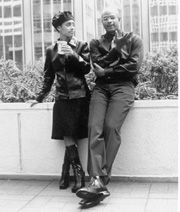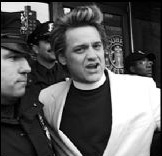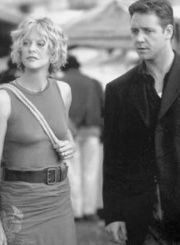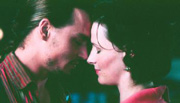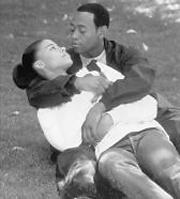“ALWAYS LEAVE THEM laughing” is the final statement of Spike Lee’s ultra- ambitious race satire. But laughing at what exactly, and at what cost? Bamboozled presents no definite answer, but it sure does raise tough questions.
BAMBOOZLED
written and directed by Spike Lee with Damon Wayans, Jada Pinkett-Smith, Michael Rappaport, and Savion Glover opens October 20 at Meridian and Lewis & Clark
Pierre Delacroix (Damon Wayans) is the sole black development exec at a TV network. His homey-er-than-thou white boss (a jive-talking Michael Rappaport) threatens him to produce a hit or be fired. “Dela,” as his able assistant Sloan (Jada Pinkett-Smith) calls him, comes up with a truly mind-blowing idea to get out of his contract— a televised minstrel show “for the new millennium,” performed in blackface. The actors (including Tommy Davidson and the terrific dancer Savion Glover), writers, and studio audiences are initially aghast with the concept—which naturally becomes a ratings sensation.
Nothing escapes Lee’s raw scrutiny here—the lack of minority writers in television, the hard sell and easy buy of America’s marketed ethnic culture, assimilation vs. separatism, the reassuring (but wrongheaded) security of nostalgia acts, and the exchange of one stereotype for another. (Lee’s pointed treatment of commercialized rap culture suggests that it’s in just as much of a pigeonhole.)
True to form, Lee’s many targets are in your face. Watching Glover and Davidson “cork up” before their throwback variety show speaks volumes on the price black talent still pays to get a shot at the big time. Meanwhile Sloan, probably the best female character Lee has put on the screen, forcefully articulates her outrage to a conflicted Dela. Still, Bamboozled frustrates with the torrent of racist imagery unleashed by Dela, then leaves him to wrestle with his flummoxed conscience. Lee contrasts this cautionary example of Buppie self-alienation with the self-proclaimed authenticity of Sloan’s rapper brother—who’s no angel himself.
Bamboozled‘s Network-like premise eventually spins out of control, its melodrama too weak and its characters too thin to support its scattered indictments. Posing as a movie, it seems more a provocative thesis laced with brazen, visual footnotes. Shot on digital video, the picture contains solid documentary material, particularly in its several montages of archival film clips and use of antique curios and toys as props. Here, Lee ably illustrates the shameful history of minstrelsy and racist caricature.
From the get-go, Lee’s usual intelligence and outrage are on display, even if he can’t wrap up the multitude of issues raised. (But then, how many “answers” are there to racism?) Bamboozled is most successful as a vitriolic running commentary on racial prejudice—from all sides—in American mass media. It’s as much a reflection of the collective conflicted mind of our popular culture as of one bold, audacious filmmaker.
